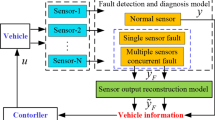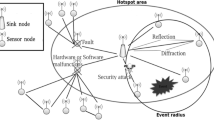Abstract
This paper develops a new fault diagnosis and tolerant control framework of sensor failure (SFDTC) for complex system such as rockets and missiles. The new framework aims to solve two problems: The lack of data and the multiple uncertainty of knowledge. In the SFDTC framework, two parts exist: The fault diagnosis model and the output reconstruction model. These two parts of the new framework are constructed based on the new developed belief rule base with power set (BRB-PS). The multiple uncertainty of knowledge can be addressed by the local ignorance and global ignorance in the new developed BRB-PS model. Then, the stability of the developed framework is proved by the output error of the BRB-PS model. For complex system, the sensor state is determined by many factors and experts cannot provide accurate knowledge. The multiple uncertain knowledge will reduce the performance of the initial SDFTC framework. Therefore, in the SFDTC framework, to handle the influence of the uncertainty of expert knowledge and improve the framework performance, a new optimization model with two optimization goals is developed to ensure the smallest output uncertainty and the highest accuracy simultaneously. A case study is conducted to illustrate the effectiveness of the developed framework.
Similar content being viewed by others
References
Ma Z, Chen L, and Wang P, Analysis of G-queue with pseudo-fault and multiple working vacations, Journal of Systems Science and Complexity, 2020, 33(4): 1144–1162.
Feng Z, Zhou Z J, Hu C H, et al., A safety assessment model based on belief rule base with new optimization method, Reliability Engineering and System Safety, 2020, 203: 107–125.
Li X, Yan R, and Zhao Y, Aging properties of the lifetime in simple additive degradation models, Journal of Systems Science and Complexity, 2011, 24(4): 753–760.
Yang S, Bryant A, Wawby P, et al., An industry-based survey of reliability in power electronic converters, IEEE Transactions on Industry Applications, 2011, 47: 1441–1451.
Li X, Lu D, Zhang W, et al., Sensor fault estimation and fault-tolerant control for a class of Takagi-Sugeno Markovian jump systems with partially unknown transition rates based on the reduced-order observer, Journal of Systems Science and Complexity, 2018, 31(6): 1405–1422.
Piltan F, Prosvirin A E, Sohaib M, et al., An SVM-based neural adaptive variable structure observer for fault diagnosis and fault-tolerant control of a robot manipulator, Applied Sciences, 2020, 10: 1344.
Jiang X F, Wang S S, Li J, et al., A strong robustness open-circuit fault diagnosis strategy for novel fault-tolerant electric drive system based on d-q-axis current signal, Chinese Journal of Aeronautics, 2021, 34: 115–127.
Cao H S, Sun P W, and Zhao L, PCA-SVM method with sliding window for online fault diagnosis of a small pressurized water reactor, Annals of Nuclear Energy, 2022, 171: 109036.
Ren Y, Wang X, and Zhang C, A novel fault diagnosis method based on improved negative selection algorithm, IEEE Transactions on Instrumentation and Measurement, 2021, 70: 1–8.
Li X and Zhang W G, An adaptive fault-tolerant multisensor navigation strategy for automated vehicles, IEEE Transactions on Vehicular Technology, 2010, 59: 2815–2829.
Chen L, Huang X, and Fu S, Observer-based sensor fault-tolerant control for semi-Markovian jump systems, Nonlinear Analysis Hybrid Systems, 2016, 22: 161–177.
Chamseddine A and Noura H, Control and sensor fault tolerance of vehicle active suspension, IEEE Transactions on Control Systems Technology, 2008, 16: 416–433.
Feng Z C, Zhou Z J, Hu C H, et al., A new belief rule base model with attribute reliability, IEEE Transactions on Fuzzy Systems, 2019, 27: 903–916.
Chen Y W, Yang J B, Xu D L, et al., Inference analysis and adaptive training for belief rule based systems, Expert Systems with Applications, 2011, 38: 12845–12860.
Cheng C, Qiao X, Teng W, et al. Principal component analysis and belief-rule-base aided health monitoring method for running gears of high-speed train, Science China Information Sciences, 2020, 9: 199292:1–199292:3.
Kong G, Xu D L, Liu X, et al., Applying a belief rule-base inference methodology to a guideline-based clinical decision support system, Expert Systems, 2010, 26: 391–408.
Yang J B and Xu D L, Evidential reasoning rule for evidence combination, Artificial Intelligence, 2013, 205: 1–29.
Zhou Z J, Hu C H, Xu D L, et al., A model for real-time failure prognosis based on hidden Markov model and belief rule base, European Journal of Operational Research, 2010, 207: 269–283.
Yang J B, Liu J, Xu D L, et al., Optimization models for training belief-rule-based systems, IEEE Transactions on Systems, Man, and Cybernetics — Part A: Systems and Humans, 2007, 37: 569–585.
Xu D L, Liu J, Yang J B, et al., Inference and learning methodology of belief-rule-based expert system for pipeline leak detection, Expert Systems with Applications, 2007, 32: 103–113.
Liu J, Yang J B, Da R, et al., Self-tuning of fuzzy belief rule bases for engineering system safety analysis, Annals of Operations Research, 2008, 163: 143–168.
Jiao L, Quan P, Denux T, et al., Belief rule-based classification system: Extension of FRBCS in belief functions framework, Information Sciences, 2015, 309: 26–49.
Zhang D, Wang Q G, Feng G, et al. A survey on attack detection, estimation and control of industrial cyber-physical systems, ISA Transactions, 2021, 116: 1–16.
Ye Z H, Zhang D, Wu Z G, et al., Adaptive event-based tracking control of unmanned marine vehicle systems with DoS attack, Journal of the Franklin Institute, 2021, 358: 1915–1939.
Zhang D, Ye Z H, Chen P C, et al., Intelligent event-based output feedback control with Q-learning for unmanned marine vehicle systems, Control Engineering Practice, 2020, 105: 104616.
Huang Z L, Lei Z H, Wen G R, et al., A multi-source dense adaptation adversarial network for fault diagnosis of machinery, IEEE Transactions on Industrial Electronics, 2021, DOI: https://doi.org/10.1109/TIE.2021.3086707.
Zhang W, Liang J, and Liang X, On the computation of virtual backbones with fault tolerance in heterogeneous wireless sensor networks, IEEE Transactions on Mobile Computing, 2021, DOI: https://doi.org/10.1109/TMC.2020.3048960.
Cao Y, Zhou Z J, Hu C H, et al., A new approximate belief rule base expert system for complex system modelling, Decision Support Systems, 2021, 150: 113558.
Zhou Z J, Cao Y, Hu G Y, et al., New health-state assessment model based on belief rule base with interpretability, Science China Information Sciences, 2021, 64: 205–219.
Author information
Authors and Affiliations
Corresponding author
Additional information
This work was supported in part by the Natural Science Foundation of China under Grant Nos. 61370031, 61374138, 61973046, 61833013, 61773389 and 71601168, the Fundamental Research Funds for the Central Universities under Grant No. D5000210690, the Shaanxi Outstanding Youth Science Foundation under Grant No. 2020JC-34 and the Natural Science Foundation of Shaanxi Province under Grant Nos. 2020JM-357, 2022JQ-580, 2021KJXX-22 and 2020JQ-298.
Rights and permissions
About this article
Cite this article
Feng, Z., Zhou, Z., Ban, X. et al. Sensor Fault Diagnosis and Tolerant Control Based on Belief Rule Base for Complex System. J Syst Sci Complex 36, 1002–1023 (2023). https://doi.org/10.1007/s11424-023-1135-y
Received:
Revised:
Published:
Issue Date:
DOI: https://doi.org/10.1007/s11424-023-1135-y




